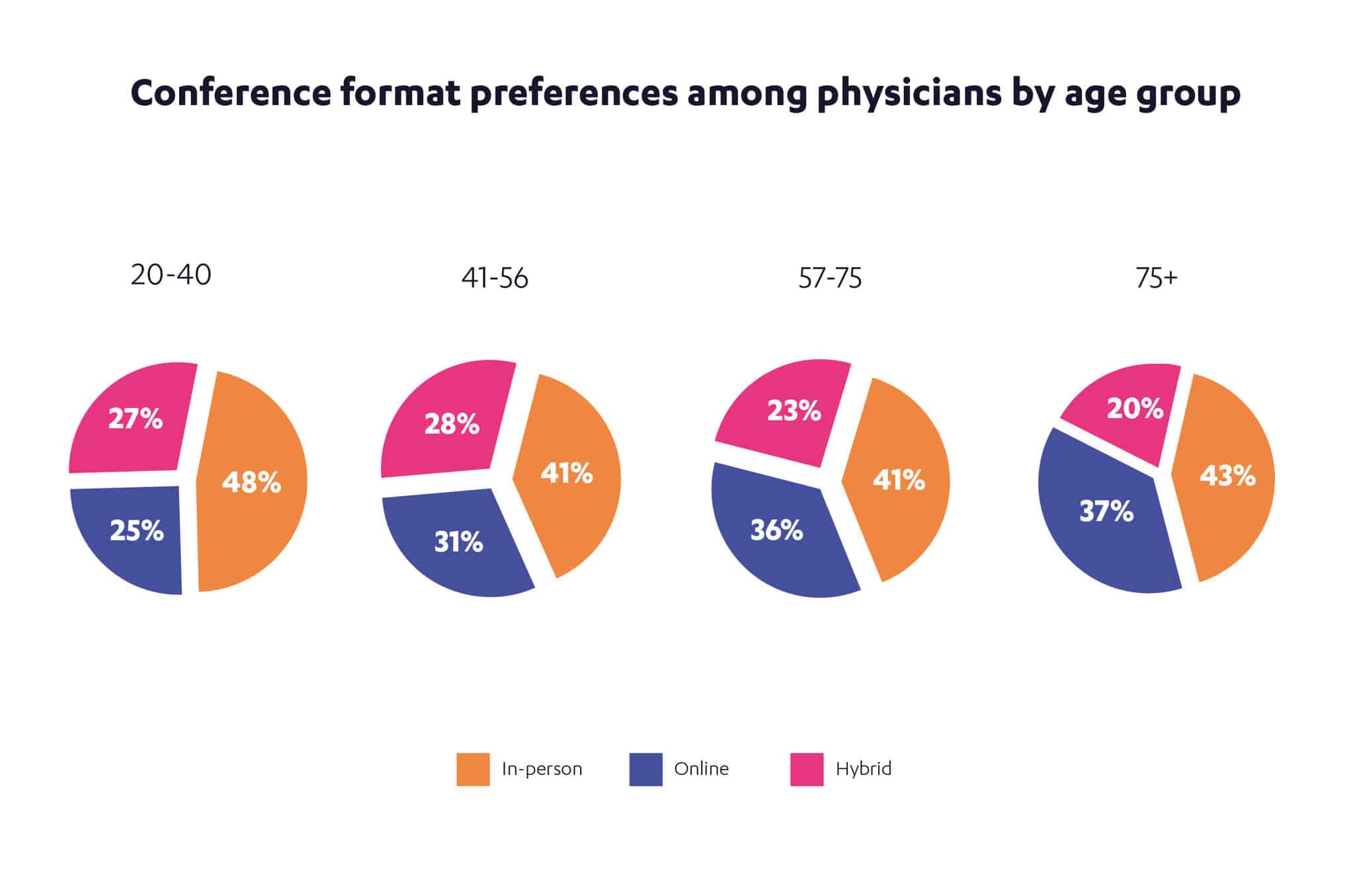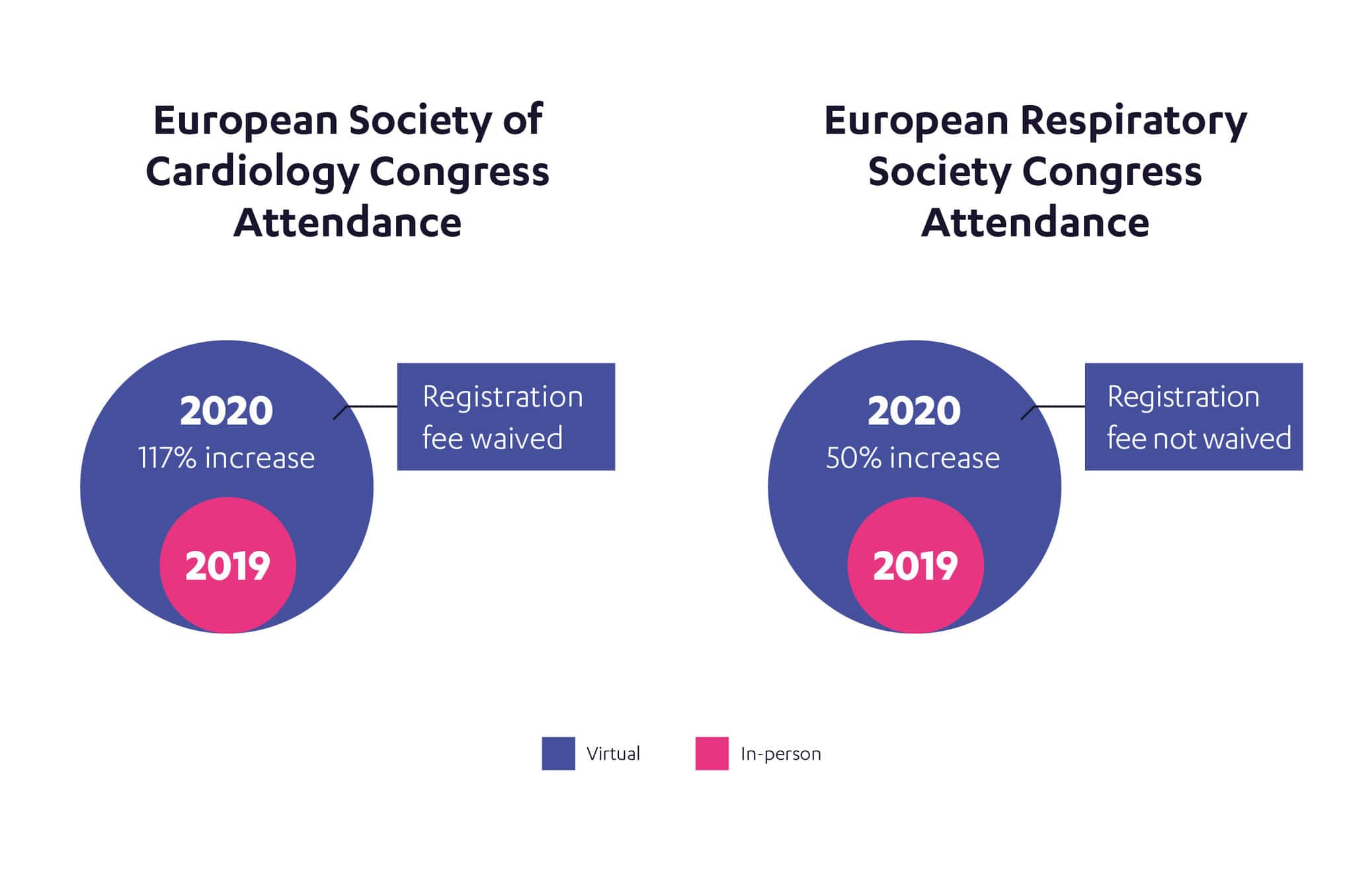Pharma conference trends and themes in the last two years
September 6, 2023 |
We take an in-depth look at the way Pharma conferences have changed in the last two years and how that’s impacted attendance, themes and format.
The COVID-19 Pandemic had an unprecedented impact on the world of Pharma conferences. We quickly saw a change in the way conferences were run, how people preferred to attend, and even a change to some of the topics discussed, with digital technology, innovation, patient centricity and accessibility becoming hot topics.
We take an in-depth look at the way Pharma conferences have changed in the last two years and how that’s impacted attendance, themes and format.
In-person or Online
Prior to 2020, most (if not all) Pharma conferences were held in person, offering attendees a chance to mingle and network as they browsed promotional stands and sat in on guest lectures.
But in the last few years, there has been a shift towards opening conferences up to a digital audience. As technology has developed and virtual meeting infrastructure has improved, people have become more accepting of online and hybrid events and Pharma has learnt to adapt to meet these new expectations .
As an agency, we’ve also learned how to make the most of these hybrid events, working on a number of hybrid events to engage with and educate delegates and clients across the world, both in their homes and at conference centres. By repurposing materials and projects for a digital platform, we’re able to give them a longer lifespan and open them to a wider audience who can access them with unparalleled ease. Not only is it quicker and easier for people to access content online, it also helps broaden our audience to people who may otherwise be unable to attend due to travel and other commitments. Plus, it’s great for the environment too, helping to reduce the impact of global travel on the climate and environment by enabling people to access content and engage with events from home.

*based on 29 conferences attended by Mednet Group in 2023
**Adapted from Ashfield Event Experiences & International Pharmaceutical Congress Advisory Association. Follow-up study of global healthcare professionals’ virtual congress experiences identifies the value of offering a choice of participation, 2021. Available from: https://ashfieldeventex.com/partnering-with-ipcaa-for-virtual-congress-hcp-research/. [Accessed July 2023]
Different people typically have different preferences when it comes to how they attend conferences, so by offering a range of options for attendees, conferences are able to appeal and support more people.

*Adapted from G-med. Which medical conference format do you prefer? Results by age group, Q42021: 1206 doctors from 75 countries across a wide range of specialities, 2022. Available from: https://pharmaphorum.com/sales-marketing/disrupted-medical-conferences-part-1-the-new-normal-is-already-here-get-used-to-it [Accessed July 2023]
Attendances
Several conferences have noticed an increase in attendance since opening up to both in-person and online attendees.
The European Society of Cardiology (ESC) found that in 2020 they had a 117% increase in attendance on the previous year, with 77,350 virtual attendees in 2020 compared to 27,946 physical attendees 2019. However, it’s important to note that the registration fee was waived in 20201.
The European Respiratory Society also noticed an increase in attendance of 50% in 2020, without waiving registration fees. In 2020, they registered 33,784 virtual attendees compared to 22,094 physical attendees in 20192.

Overall, offering the choice may be the best way forward for conferences. Giving people the opportunity to attend either in person or virtually, opens the door to people who may be unable to travel, or have prior commitments but still want to be involved in talks, while still having a physical conference space provides a chance to network for people who wish to.
Trends and topics of 2022/23

With technology forever developing and transforming, it’s no wonder that it’s a common talking point at Pharma conventions. Many events have multiple sessions looking at technology and how it can strengthen the work Pharma and HCPs do to build towards a more patient-first way of working.
Some of the common, recurring topics of conversation at recent conventions, include:
- Digital innovation – Conferences have seen an ongoing focus on digital transformation in the health sector as more biopharma companies look to increase investment in digital developments to improve the patient journey.
- Acceleration of virtual care – We’ve seen an increase in the demand for virtual care and more conferences are holding talks on virtual best practice.
- Automation and AI across healthcare – AI technology comes with a host of benefits in several areas, from clinical trials to cybersecurity. As this technology develops, more speakers are assessing what the rise of automation and AI means for HCPs and pharma.
- Patient centricity – More companies are beginning to look at patient-centred ways of operating, including direct-to-consumer channels and digital alliances, using technology to create a patient-first way of operating.
- Diversity and reducing health inequality – There’s a heavier focus on how pharma and life science companies can develop ways of working that promote health equality for all.
- Cybersecurity and cloud computing – As we move forward into an increasingly digital world, the risks to cybersecurity also grow and many conferences and talks are looking at how we keep data and patients safe as pharma develops at a digital level.
- Real-world evidence – The continued rise in real-world evidence trials will be an ongoing trend, with many companies using live and real-world data to inform their strategy and product development as a way of improving the patient experience.
References
- Roffi, M et al, European Heart Journal – Digital Health, 2021, Oct 2(4).
- European Respiratory Society (ERS). Statistics ERS International Congress 2020 Virtual, 2020. Available from: chrome-extension://efaidnbmnnnibpcajpcglclefindmkaj/https://www.ersnet.org/wp-content/uploads/2021/02/ERS2021_websitestatsreport.pdf. [Accessed: July 2023]
This content was provided by Mednet Group





